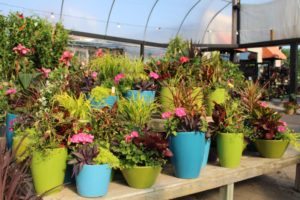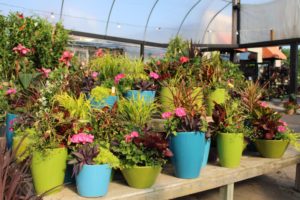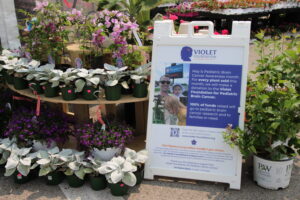Tips for Eco-Friendly Lawn Care
Many homeowners are starting to realize that a chemical-free lawn may be safer for their pets and their kids, can help keep harmful substances out of groundwater, and might even be easier and more affordable in the long run. In difficult economic times, families who decide to cancel their monthly lawn service contract and do it themselves instead will now be coming into the garden center. Some of them will be learning about lawn care for the first time and will be looking for environmentally friendly options.
The good news is that maintaining an organic lawn is easier than ever, and the right products are probably already in stock on your shelves. Consider putting together an eco-friendly lawn and landscape end cap with step-by-step signage that walks customers through the basics. Include products such as organic fertilizers, organic insecticides and fungicides, organic pest control, organic weed control, organic animal repellEnts and more.
Soil Preparation
Healthy soil encourages a deeper and stronger root system. Lawns that have been treated with chemical fertilizers may have shallow root systems and a tendency to develop thatch. Simply raking an inch of compost into the lawn twice a year, once in spring and once in fall, will add organic matter and encourage healthy roots.
Advise your customers to try a few bales of a soil-building compost that contains beneficial microbes and uses no sewage sludge or shredded construction waste in its formula. Customers who are used to raking in a strong, smelly product like steer manure will be pleased to know that a compost mix works just as well and doesn’t pose the risk of adding unwanted nitrogen to groundwater sources.
Human-Powered Tools
A push mower with a sturdy pitchfork or lawn-aeration sandals for breaking up thatch are products that environmentally conscious customers may come looking for, so include them in your display or use signs and photos to point the way to the tool section.
Some tips to include : Keeping lawn mower blades sharpened and setting the blade a little higher to encourage a thicker lawn are two mowing practices that will help reduce disease, crowd out weeds and hold in moisture to minimize the amount of water needed for irrigation. Encourage gardeners to leave the grass clippings on the lawn for supplemental nitrogen.
Safe and Simple Fertilizers
For most lawns, supplemental feeding is only necessary on a seasonal basis. Moderate-climate grasses like bluegrass, ryegrass and fescue should be fed in March, May, July and October to keep them green during the growing season. Tropical grasses like Bermuda grass and St. Augustine benefit from monthly feedings from April through August, and supplemental food is usually not necessary in the winter. Carry the appropriate fertilizers seasonally and promote them at the right times for the right lawns. It makes it easier for the customer, and the retailer will be more efficient in selling. Look for an organic fertilizer with mycorrhizae added to stimulate root growth.
Effective Weed Control
Most organic gardeners are willing to tolerate a few weeds in their lawn. Clover, for example, may actually help fix nitrogen in the soil and improve the health of the lawn. The best service you can provide to your customers is your knowledge of local weeds. Consider setting up a weed identification chart with photographs and organic weed-control strategies. Tough perennial weeds may need to be pulled by hand, creating a demand for good, durable hand tools.
Annual weeds, on the other hand, are easily treated with an organic pre-emergent made with corn gluten. If it is applied in early spring, it will suppress seed germination of dandelions, smooth crabgrass and annual bluegrass among others. Organic corn glutenbased products are widely available now.
Insect Killers
A gardener who can put up with a few weeds is probably willing to tolerate a little pest damage, too. Beneficial nematodes, available from suppliers of biological pest control products, are effective against Japanese beetles and grubs. To keep ants under control, you might want to try some of the new orange oil products. They not only control ants, they also work against fleas, aphids and other common pests.
Water-Wise Irrigation Practices
A concern for the environment doesn’t end with the products that go on the lawn. Conserving water during times of drought and preventing runoff that could carry fertilizers away from the lawn are smart practices that can really make a difference.
Set up a display of lawn sprinklers and use signage to encourage customers to water their lawns less frequently. A deep soaking once or twice a week is more effective than a shallow watering every day. Water early in the morning or late in the evening for maximum benefit, and adjust timers to account for any unexpected rainfall. In drought stricken areas, encourage gardeners to try native grasses like Buffalo grass that require less irrigation and can handle a summer dormant period if water is restricted. (This is a great time to encourage gardeners to try out rain barrels as well!)
Reduce Lawn Area
Some homeowners are reducing the size of their lawns in favor of low-maintenance perennials like native shrubs. A “Lawn Alternatives” display can include easy groundcovers and hardy native shrubs that require less water, less fertilizer, and alsHeather Colburn is sales and marketing director for FoxFarm Soil & Fertilizer Company. She can be reached at [email protected] or (707) 826-1991.o attract butterflies and other beneficial insects to the garden.
Converting lawn to landscaping is surprisingly easy: simply smother grassy areas with several layers of wet cardboard or newspaper, and top with at least 6 inches of compost, layering on dried leaves, grass clippings or manure if available. This is a great no-dig project for the fall that will get the bed ready for spring planting.
Preparing the Garden Center
Green is in, and it is new for everyone from the customer to the manufacturer. The biggest project is education. Knowing what products are green is helpful. Understanding what organic is and the different levels of classifications is vital. Also, understanding ingredients in organic fertilizers, soils, insecticides and other garden products is important because there are so many it’s not just about chicken manure anymore. Educate your staff on these items at the garden center so that consumers will be prepared and happy with their purchases. Place signs for customers throughout the store. Inquiring minds want to know.

















 Videos
Videos





